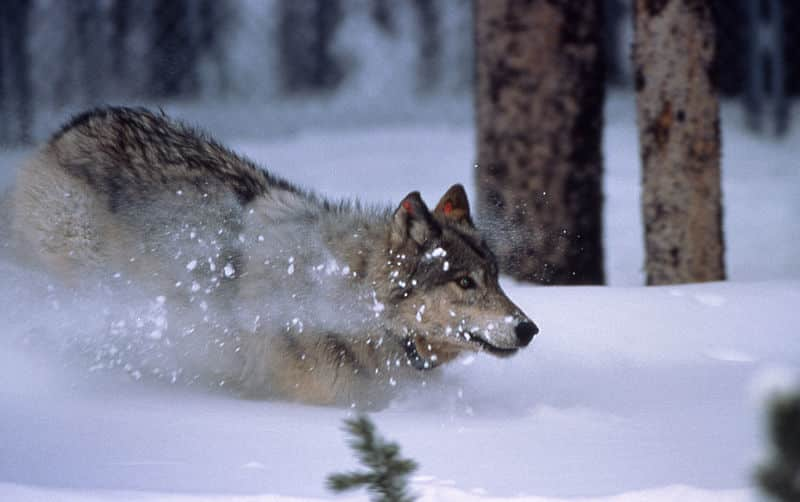Michigan Officials Say 77 Percent of Harvested Wolves Were “Problem Wolves”
OutdoorHub Reporters 01.28.14

Michigan’s first wolf hunt in four decades ended earlier this year, with hunters harvesting a total of 23 animals. Following an investigation by the Michigan Department of Natural Resources (DNR), wildlife officials agreed that 17 of the animals taken were “problem wolves,” or animals associated with packs that came into disturbing contact or conflict with humans and society. One of the wolves is still being investigated.
“What we do know is that roughly 77 percent of them were associated with packs that were known to cause problems,” DNR wildlife biologist Brian Roell told OutdoorHub. “We obviously can’t say that actual wolves harvested were the ones causing the problems, but they were associated.”
The majority of wolf conflicts involve livestock depredation, but encounters with pets and humans have also been reported.
“This hunt is designed around conflict resolution,” Roell explained. “We were specifically targeting animals that had caused depredation or nuisance-type behaviors. So we designed three rather small zones based on where we had long-standing historical issues with problem wolves. By doing that we concentrated hunters into those areas. So it’s not surprising that we have a large proportion of [harvested] animals that were known to cause problems.”
Michigan’s inaugural wolf hunt remains controversial, but less so among the residents of the Upper Peninsula, where the hunt took place. In a survey by Michigan State University, a greater proportion of Upper Peninsula residents supported the season along with a higher perception of danger from wolves.
The hunting zones that the DNR had designated were split between the Gogebic County (Unit A), portions of Baraga, Houghton, and Ontonagon counties (Unit B), and portions of Luce and Mackinac counties (Unit C). Of the three units, hunters had the most success in the central regions of Unit B, where 14 wolves were harvested.
“We consider this season a success,” Roell said. “We had a target of 43 wolves, but that is nothing more than a target. We did not achieve that target, but there are many more nuances in this season that enable it a success. The wolf season was a first for Michigan and when designing it you never know if it will all come together.”
Roell also explained that the DNR had a two-pronged approach to the wolf season: reduce the number of problem wolves in the area, and change their behavior. The DNR hopes that the problem packs will now avoid humans more readily.
“We know that hunting can result in changes to animal behavior,” said DNR fur-bearer specialist Adam Bump.
Bump said wolf packs that cause problems in Michigan are well-documented.
“We looked at the territories of packs that have been in conflicts, and we have a rough idea of where these packs spend their time,” Bump explained. “We try to draw the boundaries to include those packs.”
Wolf packs that have not been in conflict with humans were generally excluded from the hunt. Bump added that some wolves from these packs inevitably wander on to the hunting units and were harvested, but overall the results are encouraging.
“As the first implementation of a managed wolf hunt to resolve conflict [in Michigan], it went really smoothly,” Bump said.
Despite this, animal rights activists who oppose the hunt intend to prevent a second season from taking place. There are currently petitions in Michigan seeking to bring the issue to the ballot in 2014, as well as a separate petition from hunters and farmers trying to preserve the season. Opponents of the wolf hunt say that the season may be detrimental to the recovery of the species in Michigan. Roell, on the other hand, said that a hunting season is the natural conclusion to a successful recovery.
“You take an animal that was once on the brink of extinction, that people were once paid to kill and exterminate […] and now hunters are paying the state for the opportunity to take one,” Roell said. “That in itself is a success.”

